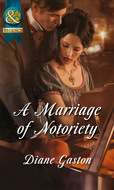Książki nie można pobrać jako pliku, ale można ją czytać w naszej aplikacji lub online na stronie.
Czytaj książkę: «The Vanishing Viscountess»
Diane Gaston
The VANISHINGVISCOUNTESS

MILLS & BOON
Before you start reading, why not sign up?
Thank you for downloading this Mills & Boon book. If you want to hear about exclusive discounts, special offers and competitions, sign up to our email newsletter today!
Or simply visit
Mills & Boon emails are completely free to receive and you can unsubscribe at any time via the link in any email we send you.
To Mallory Pickerloy,
a lovely reader whose name is worthy of a heroine
Contents
Chapter One
Chapter Two
Chapter Three
Chapter Four
Chapter Five
Chapter Six
Chapter Seven
Chapter Eight
Chapter Nine
Chapter Ten
Chapter Eleven
Chapter Twelve
Chapter Thirteen
Chapter Fourteen
Chapter Fifteen
Chapter Sixteen
Chapter Seventeen
Chapter Eighteen
Chapter Nineteen
Epilogue
Chapter One
October, 1818
The gale roared like a wild beast. Under its savage attack, the ship creaked and moaned and begged for mercy. Shouts of the crew echoed the ship’s distress as men struggled to work the pumps and save the rigging.
Adam Vickery, the Marquess of Tannerton, or Tanner, as he was known to his friends, sat with the other passengers in the packet ship’s cuddy, awaiting his demise. He remained still, arms crossed over his chest, eyes closed, reviewing his life.
He found it wanting. He’d left no mark on the world, no son to inherit his title and lands, no child to carry on his bloodline. All he had done was maintain what his father, grandfather, great-grandfather, and all the Marquesses of Tannerton had built. If he were truly honest with himself, he would say he’d not even done the maintaining. Other men did that work for him: his estate managers, men of business and secretaries. They toiled while Tanner enjoyed his gaming, his sport, his women.
A loud crack sounded and a thud on the deck shook the whole ship. A woman wailed. Tanner opened his eyes to see the woman clutching an infant and a small boy to her breast. The cabin was filled with many women like her, shaking in fear, and men, like Tanner himself, cursing their helplessness. There was no way to stop the storm, no way to calm the sea, no way to hold the timbers of the ship together.
His gaze fell on one woman who neither wailed nor cowered from the storm. With an expression of defiance rather than fear, she stood next to a Bow Street Runner, leather shackles on her wrists, obviously his prisoner. Only a few hours ago, at the beginning of this voyage from Dublin to Holyhead, Tanner’s gaze had been drawn to her, so dignified in her plight. What crime had she committed to warrant her escort from Ireland? He’d been too blue-devilled to bother inquiring about her, however. Now he wished he’d spoken to her, or at least smiled at her. She seemed every bit as alone as he.
When the winds began their fierce assault, the first mate had gathered all the passengers into this cabin. He’d told them they were close to the Anglesey coast. Of course, the Anglesey coast could be rocky and treacherous, although the man neglected to mention that part.
What could be worse? Tanner wondered. Plunging into the cold depths of the Irish Sea? Or being dashed upon some craggy rocks?
Either would mean death.
The first mate popped in a second time when the storm intensified. “All will be well,” he reassured them. None of the passengers believed him. Tanner could see it in their eyes. He felt it in his own soul. Tanner watched a man remove a miniature from his pocket and stare at it, a portrait of a loved one he would never see again, of someone who would soon be grieving.
Who would grieve for the Marquess of Tannerton? His friend Pomroy would likely drink a toast to his memory now and then. A mistress or two might consider him a fond memory. Perhaps the Duke of Clarence or even the Regent himself might recall him after the space of a year or two, but more likely not. Algernon, his fribble of a cousin, would be terrified at the prospect of inheriting the lofty title and its responsibilities. Tanner rubbed his face, regretting he’d never taken Algernon in tow and taught him how easy it all was. Algernon could busy himself with purchasing new coats or the latest fashion in boots or all the watch fobs and stick pins he fancied.
The Bow Street Runner began pacing, Tanner noticed, and the prisoner flashed the man an undisguised look of contempt.
Would she have anyone to mourn her?
She stood with her chin high and her startling blue eyes vigilant. He disliked thinking of what the sea would do to her, turning her body all bloated and white.
He glanced away, shaking that horrible image from his mind, but no matter where he looked, his eyes were drawn back to her.
She was tall and slender, with the same dark hair and piercing blue eyes of the woman who’d briefly captivated him a year ago. That was where the resemblance ended, however. Rose O’Keefe had made the right choice when she’d chosen Tanner’s former secretary, Jameson Flynn, over Tanner himself. Flynn had offered the Vauxhall singer marriage, something Tanner would never have done. Flynn had also loved her.
Tanner laughed inwardly at the irony of it all. The secretary preferred over the marquess. He could not muster any resentment, however. Rose had picked the better man.
He frowned and bowed his head. Tanner’s zeal had not been to love Rose, but to outwit another rival for her favours. Three people had died as a result. Three lives on his conscience because of his heedless selfishness.
Purchasing the Dublin theatre for Flynn and Rose did not make amends for the destruction Tanner had set in motion, but it did give the married couple the means to a new life. That was the very least Tanner could do. He’d travelled to Dublin for their opening performance, and now he was crossing the Irish Sea again, heading back to England on this Holyhead packet.
The ship had been scheduled to land hours ago, but the storm stalled them and now the day was late. He pulled his timepiece from his pocket. It was near nine p.m.
Another shuddering crash came from above. Tanner stuffed his watch back into his pocket and glanced at the prisoner. Her eyes flashed with alarm. Tanner could not blame her. Her life—and his own empty one—appeared to be edging towards the end.
The cabin door sprang open and the first mate, drenched and dripping on to the wooden floor, yelled, “Everyone on deck! To the boats. Women and children first.”
The death knell. The captain no longer expected the ship to remain intact. It was time to risk the lives of the women and children in the small boats.
There were quick anguished embraces as goodbyes were tearfully said. Panicked men tried to push in front of mothers clasping the hands of terrified children. Tanner rushed forward and pulled the men back. He used his stature and strength to keep the way clear. The prisoner was the last woman out of the door, her Bow Street Runner pushing her on, his hand firmly clamped around her arm. The man could have at least untied her shackles. What could it matter now? At least allow her to die free.
Tanner was the last person to come up on deck. As he stepped out into the air, the rain sliced him like knife blades, the wind whipping in all directions. The ship’s masts no longer stood tall and proud, but lay like snapped twigs on the deck.
The sails, now in tatters, resembled nothing more than rags flapping haphazardly in the tempest. Tanner stepped over pieces of wood, remnants of sails and other debris. A loose barrel rolled towards him. He jumped aside, nearly losing his footing on the slick surface of the deck. More than once he had to grab hold of whatever was near to keep from falling.
Tanner pushed his way through to where the women and children were being loaded into boats. Although he feared the effort futile, Tanner pitched in, helping lift women and children over the side of the ship to crewmen waiting in the boats. Lightning flashed, illuminating the shadow of the shore, so distant when the sea churned like a cauldron, violently pitching the ship. The boat’s fragile passengers would have a treacherous ride.
Let these people survive, he prayed.
He lifted a child into waiting arms and her mother after her. This was the last boat, and the crewmen manning it were already starting to lower it to the sea. Tanner reached for the woman prisoner, who, outwardly calm and patient, had held back so the others could go before her. Tanner scooped her into his arms to lift her over the side, but, at that same moment, the Bow Street Runner shoved them both, knocking them to the deck, jumping into the boat in her place. Tanner scrambled to his feet, but it was too late. The boat had hit the water, the crewmen rowing fast to get it away.
“Bastard!” Tanner cried. In the howling wind, he could barely hear his own words.
The prisoner’s eyes blazed with fury and fear. She struggled to stand. Tanner grabbed her arm and pulled her to her feet.
“The ship’s going to break apart!” the first mate cried, running by them.
Tanner glanced wildly around. Some of the crew were lashing themselves to pieces of mast.
“Come on,” he shouted to the woman, pulling her along with him.
Tanner grabbed rope from the rigging and tied her to a piece of broken mast. He would be damned if that scoundrel Bow Street Runner survived and she did not. He lashed himself next to her, wrapping one arm around her and the other around the mast. The ship slammed into rocks, sending them, mast and all, skittering across the deck.
The vessel groaned, then broke apart in a cacophony of cracks and crashes and splintering wood. Their piece of mast flew into the air like a shuttlecock, the wind suspending them for several moments before plunging them into the churning water.
The impact stunned Tanner, but the shock of the needle-sharp cold roused him again. The howling of the wind, the hissing of the rain, the screams of their shipmates suddenly dulled to a muffled growl. The water was inky black and Tanner had no idea which way was up, but his arm was still around the woman. He had not lost her.
Their wooden mast began rising as if it, too, fought to reach the surface. Tanner kicked with all his strength, his lungs burning with the urge to take a breath.
When they broke the surface of the water, it was almost as great a shock as plunging into its depths. Tanner gulped for air. To his relief, he heard the woman do the same. She had survived.
Then a wave crashed over them and drove them forward. Tanner sucked in a quick gulp of air before they went under. Again they resurfaced and were pushed forward and under once more.
When they popped to the surface, Tanner had time to yell, “Are you hurt?”
“No,” she cried.
He tightened his grip on her as another wave hit. If the sea did not swallow them, the cold would surely kill them.
Or the rocks.
This wave thrust them further. Through the sheen of rain and sea, Tanner glimpsed the coast, but jagged rocks lay between, jutting up from the water like pointed teeth. Another wave pelted them, then another. The ropes loosened and were washed away. The woman’s grip slipped from the mast. Tanner could hold on to the mast or the woman. He held on to the woman.
Her skirts were dragging them down and her bound wrists made it hard for her to swim. Tanner kicked hard to keep them above the water, only to see the rocks coming closer. He swivelled around to see if other survivors were near them, but not a soul was visible. No one to help them. No one to see. Perhaps no one to survive.
The next wave drove them into one of the rocks. She cried out as they hit. Another wave dashed them into another rock. Tanner tried to take the blows instead of her, but the water stirred them too fast. He lost feeling in his arms and legs and he feared he would lose his grip on her.
Not another death on his conscience. Tanner could not bear it. God, help me save her, he prayed. Help me do something worthwhile. One last bloody something worthwhile.
He slammed into a jagged rock and everything went black.
When Tanner opened his eyes, he felt cold wet sand against his cheek. He could see the water lapping the shoreline inches from his face. Its waves sounded in his ears, and whitecaps seemed to wink at him. There was hard ground beneath him, however. Hard solid ground.
The woman! He’d lost her. Let go of her, damn him. Despair engulfed him as surely as had the Irish Sea. His limbs felt heavy as iron and his soul ached with guilt. He’d let go of her.
A light glowed around him, bobbing, then coming to a stop. Suddenly someone’s hands were upon him, rough hands digging into his clothes, searching his pockets.
He seized one of the groping hands, and his attacker pulled him upright, trying to break free. Tanner’s grip slipped and he fell back onto the sand. The man advanced on him, kicking him in the ribs. Tanner rolled away, trying to escape the blows, but the man kicked him again.
“Your money,” the man snarled as he kicked him once more. “I want your money.”
Every English coast abounded with wreckers, people who flocked to the shore eager to see a ship founder, so they could seize whatever bounty that washed ashore. Tanner had never thought to meet one.
He curled himself against the onslaught of the man’s boot, as he struck again and again. A loud thwack sounded and the man collapsed on top of him. Tanner shoved him off and sat up.
The woman stood above them, a long piece of wood, part of the ship, no doubt, in her trembling, still-shackled hands.
Marlena Parronley stared at the prone figure, the brute who had so violently attacked her rescuer, the Marquess of Tannerton. She’d hit the villain with all her remaining strength.
Perhaps this time she really had killed a man.
Tannerton struggled painfully to his knees, staring at her, holding his sides, breathing hard.
Marlena had recognised Tannerton immediately when she’d first seen him on board ship, but he’d shown no signs of remembering her.
Thank goodness.
That first Season in London—her only Season—he’d attended many of the entertainments, but he was already a marquess and she was a mere baron’s daughter, a Scottish baron at that. He’d provided her and Eliza with some excitement in those heady days, however. They’d called him Tanner, as if they had been admitted to that close circle of friends he always had around him. They’d peeked at the handsome marquess from behind their fans, he so tall, his brown hair always tousled. And his eyes! They’d been in raptures about his mossy green eyes. She and Eliza had devised all manner of ways they might meet him, none of which they’d dared to carry out.
Too bad they had not thought of being caught in a gale on a ship that broke apart and tossed them in the sea.
We forgot that one, Eliza, Marlena silently said.
“Have I killed him, do you think?” she asked the marquess.
Tanner reached down to place his fingers on the man’s neck. “He’s alive.”
Marlena released a breath she’d not realised she’d been holding.
Tanner rose to his feet.
“Are you injured?” he asked, his breathing ragged.
She shook her head, sending a shiver down her body. He still showed no signs of recognising her. He pulled off his wet gloves and reached for her hands to work on the leather bindings. When she’d been on the ship they had chafed her wrists, but she was too numb to feel them now. Her teeth chattered and she started trembling all over, making his task even more difficult. He leaned down to loosen them with his teeth.
Finally the bindings fell to the sand and she was free. Marlena rubbed her wrists, but she could not feel her hands.
“We need to find shelter. Dry clothing.” He glanced around.
They were in a small cove, dotted with jutting rocks and a small patch of sand. Steep black cliffs imprisoned them as certainly as the walls of Newgate Prison.
Tanner touched her arm. “If that fellow managed to get in here, we can get out.”
She nodded, but suddenly any strength she’d possessed seemed to ebb. It was difficult to think. The cold had seeped into her very bones.
He rubbed her arms, then pressed a hand on his ribs and winced. “Come now. We’ll be warm and dry very soon.”
He picked up the man’s lantern and circled their prison walls. She could do nothing but watch. A huge wave tumbled ashore, soaking her feet again, but she could only stare at it swirling around her ankles. He crossed over and took her arm, pulling her away from the water.
He’d once danced with her, she remembered, although he never knew it. Lady Erstine had held a masquerade ball, a respectable one, and she and Eliza attended, having spent many agonising hours deciding what costume to wear. Tanner had danced one dance with Marlena without knowing who she was. Eliza had been green with envy.
“Stay with me,” he said, holding her firmly.
What looked like one massive black rock was really two, with a narrow corridor between them. He held her hand and pulled her through. They climbed up smaller rocks that formed a natural stone staircase. When they finally reached the top, they found flat and grassy farmland. The storm had passed at last, but in its wake blew a cool wind that made Marlena’s clothes feel like ice.
In the distance they spied one light. “A farmhouse,” he said. “Make haste.”
Marlena had difficulty making sense of his words. She liked his arm wrapped around her, but disliked him making her walk, especially so briskly. He made sounds with each breath, as if every step brought pain. Pain would be preferable to feeling nothing, Marlena thought. She was no longer aware of her arms or her legs.
The light grew nearer, but Marlena forgot what it signified. Her mind felt full of wool and all she wanted was to sleep.
She tried to pull away from him. “Rest,” she managed to say. “Sleep.”
“No.” He lifted her over his shoulder and carried her.
They came to a cottage with a lone candle burning in the window. Tanner pounded on the door. “Help us! Open the door.”
Soon a grizzled man in a white nightcap and gown opened the door a crack.
“Quick. I must get her warm,” Tanner told him.
“Dod i mewn,” the man said. “Come in, come in.”
Tanner carried her inside and made her stand in front of a fireplace. The dying embers on the hearth gave heat, but the heat felt painful after the numbing cold.
“Bring some blankets,” Tanner ordered. “I must warm her.”
The man tottered into another room, and Tanner began stripping her of her clothing, which seemed a very odd thing for him to do, but nice, because her wet clothes were so very heavy, and she wanted to feel light again.
Suddenly dry cloth covered her shoulders and Tanner made her sit in a chair close to the fire.
The old man threw more lumps of coal into the fireplace, and poked at it with the poker, which only made it hotter and more painful.
“M’wife and son are at the wreck,” the man explained.
Oh, yes, Marlena dimly remembered, as shivers seized her. She had been on a ship that had broken apart. She remembered the shock of the cold water.
A cat ambled by, rubbing its fur against her legs. “Cat,” she said to no one in particular, as her eyelids grew very heavy.
Marlena woke to find herself nestled in a nice warm bed with heavy bedcovers over her. She did not seem to have on any clothing at all, not even a shift. Next to her, also naked and holding her close, lay the Marquess of Tannerton.
Chapter Two
The woman felt warm against him, warm at last, when Tanner had thought never to be warm again. He slipped his hand down her smooth back, savouring the feel of her silky skin under his fingertips. He could still smell the sea on her, but they were both blessedly dry. And warm. He had saved her from the sea, thank God.
Thank God.
A shuffle sounded in the room and a murmur, and the woman pushed away from him with a cry.
He sat up like a shot.
The woman slid away to a corner of the bed, clutching the blanket up to her chin. Morning light shone through the small window and three pairs of eyes stared at them both, the wrinkled old man who had opened the door to them the night before, a wrinkled old woman and a younger, thick-chested man.
“What the devil?” Tanner growled.
The spectators jumped back. The old man gave a servile smile. “M’wife and son are back.”
Tanner glared at them. “You disturb our privacy.”
In actuality, he and the woman were the intruders. Tanner had given the old man little choice but to relinquish what was surely the bed he shared with the old woman. The night before all Tanner could think of was to cover the woman in blankets and warm her with his own body—and be warmed by hers. He’d left their clothing in a pile in the front room and carried her to the little bedchamber behind the fireplace, ordering the poor man to bring as many blankets as he owned.
The younger man—the farmer’s son, obviously—rubbed his head and winced, and the hairs on the back of Tanner’s neck stood on end. The son, he would swear, had been his seaside attacker. Tanner frowned. Their place of refuge suddenly seemed more like a lion’s den.
He quickly regained his composure. “What are you doing in this room?” he demanded again, checking his finger for his gold signet ring and feeling under the bedcovers for the purse he’d had sense enough to remove from his coat. He held it up. “Were you looking for the purse?”
The younger man backed away to where clothing hung by pegs on the plastered walls above two wooden chests.
“We merely came to see if you required anything, that is all.” The old woman simpered.
Tanner scoffed. “All three of you at once?”
The young man gave a chagrined expression and inclined his head.
Tanner glanced at his companion, still huddled under the blanket. He turned to the others. “Leave us,” he commanded.
The old man and woman scurried towards the door. Their son moved more slowly, his hand returning to his head.
“We require our clothing.” Tanner added.
The woman paused in the doorway. “Your things are still damp, m’lord.” She tipped her head in a servile pose. “I’ve hung them out in the sun and the wind. ’Twill take no time at all to dry.”
“Good.” Tanner’s tone turned a shade more conciliatory. “Treat us well and you will be rewarded.” He lifted the purse.
The son smiled. “What else do you require, m’lord?”
“Some nourishment, if you please.”
The man bowed and closed the door behind him.
“They thought they could nick my purse,” Tanner muttered, rubbing the stubble on his chin. He did not have the heart to worry her with his suspicions about the farmer’s son. “How do you fare, miss? Are you all right?”
She moved beneath the blanket as if testing to see if all parts of her still worked. “A little bruised, but unharmed, I think.”
Her eyes flicked over him and quickly glanced away. Tanner realised he was quite bare from the waist up. From the waist down, as well, but the covers concealed that part of him. He reached for a blanket and winced, pressing a hand to his ribs.
“You are bruised,” she cried, reaching towards him, but immediately withdrawing her hand.
He looked down at himself, purple bruises staining his torso like spilled ink. “Nothing to signify,” he said, although his breath caught on another pang of pain.
He glanced at her again and the humour of the situation struck him. It was not every day he woke up in a naked embrace with a woman whose name he did not know.
He gave her a wry smile. “I do not believe we have been introduced.”
Her eyelids fluttered, reminding him of shy misses one encountered at Almack’s. “No, we have not.”
He made a formal bow, or a semblance of one there in the bed only half-covered by a blanket. “I am Tannerton. The Marquess of Tannerton. Tanner to my friends, which, I dare say—” he grinned “—I had best include you among.”
The blue of her eyes sparkled in the morning light. “Marquess—” She quickly cast her eyes downward. “My lord.”
“Tanner,” he corrected in a friendly voice. “And you are…?”
He had the feeling her mind was crafting an answer.
“I am Miss Brown, sir.”
It was a common name, and not her real one, he’d wager.
“Miss Brown,” he repeated.
She fussed with the blanket, as if making sure it still covered her. “Do you know of the others from the ship? Did anyone else survive?”
He gave her a steady look. “The Bow Street Runner, do you mean?”
She glanced away and nodded.
He made a derisive sound. “I hope he went to the devil.”
She glanced back at him. “Did any survive?”
“I know nothing of any of them,” he went on, trying not to think of those poor women, those helpless little children, the raging sea. “We were alone on the beach, except for the man who tried to rob me.” The man who had just left this room, he suspected. “We made it to this cottage, and all I could think was to get you warm. I took over the farmer’s bed and must have fallen asleep.”
She was silent for a moment, but Tanner could see her breath quicken. He suspected she remembered the terror of it all.
“I believe I owe you my life, sir,” she whispered.
Her blue eyes met his and seemed to pierce into him, touching off something tender and vulnerable. He glanced away and tugged on the covers, pulling off a faded brown blanket. He wrapped it around his waist and rose from the bed. “Let me see about getting you some clothes. And food.” He turned towards the door.
“A moment, sir,” she said, her voice breathless. “Do—do you know where we are? Who these people are?”
“Only that we are in a farmer’s cottage,” he replied, not entirely truthfully. “There was a lamp in the window. I walked towards its light.”
She nodded, considering this. “What do they know of us?”
His gaze was steady. “I did not tell them you were a prisoner, if that is your concern.”
She released a relieved breath. “Did you tell them who you are?”
He tried to make light of it all. “Last night I only saw the old man. I fear I failed to introduce myself. My manners have gone begging.”
“Good,” she said.
“Good?” His brows rose.
“Do not tell them who you are.”
He cocked his head.
“A marquess is a valuable commodity. They might wish to ransom you.”
She was sharp, he must admit. Her mistrust gave even more credence to his suspicions. He had thought to bully these people with his title, but he now saw the wisdom of withholding who he was—as well as who she might be.
He twisted his signet ring to the inside of his palm and put his hand on the door latch. “I will not say a word.” Her lovely face relaxed. “Let me see about our clothing and some food and a way out of here.”
She smiled and he walked out of the room, still holding the blanket around his waist.
It took Marlena a moment to adjust when he left the room. The marquess’s essence seemed to linger, as well as the image of him naked. She and Eliza had been too naïve to speculate on how the Marquess of Tannerton would look without clothing, but she could now attest that he looked spectacular. Wide shoulders, sculpted chest peppered with dark hair that formed a line directing the eye to his manly parts. She’d only glimpsed them upon first awakening, but now she could not forget the sight. He was like a Greek statue come to life, but warm, friendly and flirtatious.
He might not recognise her as the notorious Vanishing Viscountess, subject of countless Rowlandson prints and sensational newspaper stories, but he did know she’d been a prisoner. He would, of course, have no memory of the very naïve and forgettable Miss Parronley from Almack’s.
She hugged her knees. As long as he did not recognise her, she was free. And she intended to keep it that way.
She had no idea what piece of shore they’d washed up on, but it must be closer to Scotland than she’d ever dared hope to be again. She longed to be in Scotland, to lose herself there and never be discovered. A city, perhaps, with so many people, no one would take note of a newcomer. She would go to Edinburgh, a place of poetry and learning. Who would look for the Vanishing Viscountess in Edinburgh? They would think her dead at the bottom of the sea.
She’d once believed she’d be safe in Ireland, in the ruse she and Eliza devised, governess to Eliza’s children. Not even Eliza’s husband had suspected. Marlena had been safe for three years, until Eliza’s brother came to visit. Debtors nipping at his heels, Geoffrey had come to beg his sister for money.
Marlena would have hidden from him, or fled entirely, but Eliza and the children had been gravely ill from the fever and she could not bear to leave. Geoffrey discovered her tending to them. He’d recognised her instantly and suddenly realised he could raise his needed funds by selling the whereabouts of the Vanishing Viscountess.
Geoffrey had long returned to London the day Marlena stood over Eliza’s newly dug grave in the parish churchyard, the day the magistrate’s men and the Bow Street Runner came to arrest her.
She swiped at her eyes. At least we nursed the children back to health, Eliza.
She rose from the bed and wrapped the blanket around her like a toga. The room was tiny and sparse, but clean. There was no mirror, so she tried to look at herself in the window glass, but the sun was too bright. She felt her hair, all tangles and smelling of sea water. It was still damp underneath. She sat back on the bed.
Darmowy fragment się skończył.








